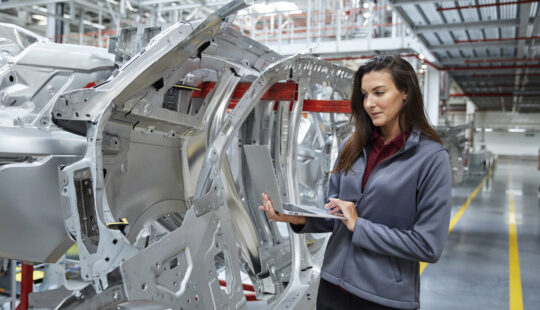Five years ago, event manager Jenny Bittmann was given a mission: to shrink the ecological footprint of SAP events and to firmly integrate aspects like diversity, inclusion, and social issues into event planning and execution. To accomplish this, she and her colleagues in the Sustainability department and elsewhere developed a strategy and published guidelines.
I spoke with her about the success of the project and where there is still room for improvement.
Q: What are your greatest successes so far on your mission to make SAP events more sustainable?
Bittmann: First of all, it’s a real success to have advanced this topic to the top of the agenda. When event managers from Google and Amazon approach us at the IMEX, one of the largest trade shows for business events, and ask us how we launched and implemented our strategy for sustainable events, it shows that we’re pioneers in this extremely important area.

I’m also proud that we’ve started measuring our social and ecological footprint with actual figures, because that’s an important step towards real improvement. It lets us compare, readjust, and define even more ambitious targets. Our analysis of the last SAP Sapphire conference, which was organized as a decentralized event in the U.S., Spain, Brazil, and online, showed that we reduced CO2 emissions by nearly 24,000 tons compared to when we had just one central event in Orlando, Florida, due primarily to the shorter distances traveled. In mathematical terms, that corresponds to around 2,200 around-the-world flights!
I’m also happy about a lot of little things, for instance, that we did without single-use plastics completely at SAP TechEd in 2019 in Barcelona, Spain, preventing three tons of waste – enough to fill a 10 by 10 meter room one meter high – at just this one event!
To be successful, we all have to pull together. Our Global Events team, together with the teams in the regions, has proven that we have a huge amount of leverage together and are motivated to get even better.
What are the biggest challenges you face?
The global strategy and our specific action recommendations can’t always be implemented uniformly because they depend on each country’s economic and cultural context. In Brazil, for example, good hospitality means putting the best meats on the table – which made it a real headache for the local event team members to create a menu that was 40% vegetarian. They found a good compromise, however, by making sure to choose meat varieties that had a smaller ecological footprint than others.
In some parts of Asia, in contrast, it would be considered rude if we didn’t give small gifts to speakers as a sign of gratitude. In this case, we and the event team considered potential alternatives to the usual giveaways, for instance tree-planting certificates as an unusual gift.
These examples underscore how we often have to think outside the box together and identify new solutions, but can also unleash creativity in the process and sometimes even change people’s mindsets.
What are your targets for the coming year?
We want to improve our waste prevention even further and increase our recycling quota. We want to avoid non-reusable plastics completely and use sustainable materials for our branding items as much as possible. As far as emissions are concerned, we want to reduce travel activities even more, and we’ve been purchasing carbon offsets for unavoidable trips for some time now. When it comes to catering, we want to offer more vegetarian dishes and locally source at least half of the food served.
In addition, we are striving to recruit more female speakers to the stage, gain more social enterprises as suppliers, and strengthen social partnerships. Even if it means extra work for the local teams, I’m very impressed that so many of my colleagues spare no effort to achieve measurable improvements – and I hope their numbers will continue to grow!
Do you have any advice for people who want to do their part in making company events more sustainable?
We should have the courage to do things differently – and better! One example: the most recent shareholders’ meeting was the first one to do away with SAP plastic bags, notepads, and pens, and the outcry was much less than expected. We simply decided to scrutinize this established practice because when both the integrated report and the ballot papers are exclusively virtual, shareholders don’t need these things anymore.
There are many examples of things “that we’ve always done that way” – call them into question! When we banned disposable beverage bottles at SAP TechEd, no one shed a tear. The visitors were thrilled by our concept of giving out high-quality bottles and offering endless refills at the water stations. At the same time, this also supported a water project, which was very well received.
Banners to Bags
In 2023, the event team for Hannover Messe had a creative idea for giving a second life to the 260 m² of printed fabric banners at SAP’s booth. They brought some of it to Lebenshilfe Bruchsal-Bretten e.V., a workshop for the disabled, where it was sewed into 260 shopping bags as part of the Comebags project. The rest was turned into 200 cable bags by Heidelbag, a local company.
The team has also made major strides in reducing electricity consumption; reusing promotional gifts, wood, and other materials; reducing food waste and travel activities; and in many other areas.



